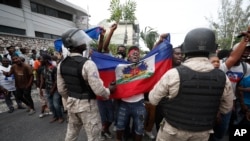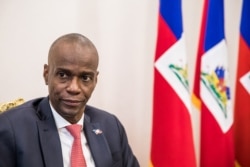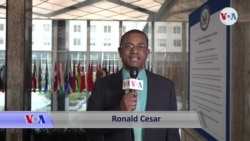The U.S. position remains that Haiti’s president, Jovenel Moise, was democratically elected and that only a dialogue between the country’s stakeholders and elected officials can resolve the nation’s worsening political crisis.
“We recognize that Haitians are tired, that Haitians want jobs, they want a better life. That is why we are urging all political stakeholders to sit down together as soon as possible and enter into dialogue to discuss forming a government,” Jon Piechowski, deputy assistant secretary of state overseeing public diplomacy in the Bureau of Western Hemisphere Affairs, told VOA Creole Thursday.
The affirmation echoes a statement issued by the U.S. Embassy in Haiti last week expressing concern about the current state of affairs.
Haiti has been without a government since March, when Jean Henry Ceant was forced to resign amid corruption allegations and a no confidence vote. Moise’s subsequent nominees for the position failed to earn enough votes in both chambers of Parliament to be ratified.
In addition, a fuel price hike in July 2018, corruption allegations implicating the president’s businesses, high inflation, unemployment and rampant crime has roiled the nation, sparking nationwide protests to demand the president’s resignation.
This month, religious groups, educators, businessmen, the working class and police officers joined the opposition and anti-corruption activists to call on the president to resign. As protests ramp up, schools and businesses remain shuttered.
Moise, who has been criticized for his inability to govern effectively, blames “the system” (of government) for the nation’s problems. He has called for a national dialogue for months, and says he has no intention of resigning.
Meanwhile, the opposition rejects the dialogue offer, saying the president’s resignation is non-negotiable. Asked what the U.S. is prepared to do if the opposition refuses to participate in a dialogue, Piechowski said the situation will only get worse.
"Well, I think we will see more problems for Haiti, because right now, we are not providing assistance for development. Investors can’t invest in the country. Everything is on hold. As you said, schools are closed, so that is what will (continue to) happen if they can’t sit down and enter into a dialogue to form a new government."
He said the U.S. holds Haiti’s elected officials in the Senate and Chamber of Deputies responsible for the political gridlock and urged them to “act responsibly.”
Some Haitians begrudge the U.S. for continuing to back Moise while calling for regime change in Venezuela. Piechowski said the two cases are completely different.
“The difference is that Jovenel Moise and the political institutions of Haiti are democratic institutions. In the case of Venezuela, (President Nicolas) Maduro is not a democratic leader. He’s a dictator. He was not elected in free and fair elections. He lacks political legitimacy. That is the difference. That is why we support the Haitian government,” Piechowski said.
Faced with a food shortage, the government of Haiti recently sent an urgent request to the U.S. State Department for food aid. Asked about the status of the request, Piechowski did not say if it would be granted.
“This shows that Haiti’s problems are becoming more serious, while there is no functioning government. This concerns the United States, as well as the international community, because we know that the people of Haiti are suffering,” he said.
Piechowski was also asked about concerns among some Haitian opposition leaders that the U.S. was considering canceling their visas as leverage.
“Of course there are always measures we can take against people who commit crimes or who behave undemocratically, but I don’t want to speculate on that at this time,” he said. “What we desire is for all political stakeholders in Haiti to sit together and enter into dialogue as soon as possible to discuss forming a government. “
Piechowski expressed continued support for Haiti’s democratic institutions and its people.
“We would like to see conditions in the country that will allow (U.S.) cooperation to be completely restored. But until the country has a functional government we will not cooperate with Haiti,” he said.
Ronald Cesar contributed to this report.







